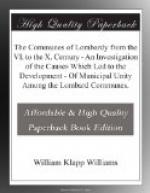To sum up briefly the chief characteristics of the early and obscure period which we have been considering, I think we can truly call it a transition period, and its history a tottering bridge from the dead Roman municipal system of the past, to the new state and city life of the future; from a state of society where, as we have seen, the city had changed from a political to an administrative division, to one where the city was to prepare itself again to claim, and eventually, by the growth of internal resources, to gain the lost function of sovereignty. The condition of the people during this time we have seen to be wretched in the extreme; the dismantled city but a bunch of comfortless dwellings; its inhabitants but a semi-servile population, with a small admixture of refugees of a better class; the city occupying but a subordinate place as part of the rural holding within whose limits it stood; whatever of wealth it contained an easy if not a legitimate prey to the turbulent spirits, whose mutual contests kept the surrounding country in a continual state of disturbance. The only men of any influence in the community we have seen to be the bishops, who, while steadily gaining in rank and power, stood forth as defenders of the people. During all this time, however, the new sap brought by the northern conquerors has been slowly but steadily entering into and forming the constitution of the people. The chaste and uncorrupted Northmen have by means of legitimate intermarriage with the best of the enervated inhabitants of the land, raised up an almost new race, who combine in their nature the humanizing effects of the old civilization with the love of independence and the temperate virtues of the northern conquerors, a race willing to benefit by the experience of the past, and resolved to carve out for itself a new and independent future.
PART II.
ELEMENTARY SOURCES OF MUNICIPAL UNITY IN LOMBARD AND FRANKISH TIMES.
In the second part of this paper we have to consider a period of development rather than one of transition, of growth rather than of change. We have before us the task of tracing the advance from a period of barbarism to one when the feudal system had obtained an almost complete domination over the social system of Europe. Considering the principles which lay at the base of the society of new Europe, this system is a natural, indeed an unavoidable evolution from the stage of barbarism and social disorganization. The confusion in all social and economic relations consequent on the combination of the old and the new elements in European life, had led to a state of disintegration that could not continue. A new regulative force was required which would at the same time have power sufficient to control the various warring elements with which it had to deal and reduce them to some sort of harmony, and yet which would not in its nature be in opposition to the decentralizing spirit and




